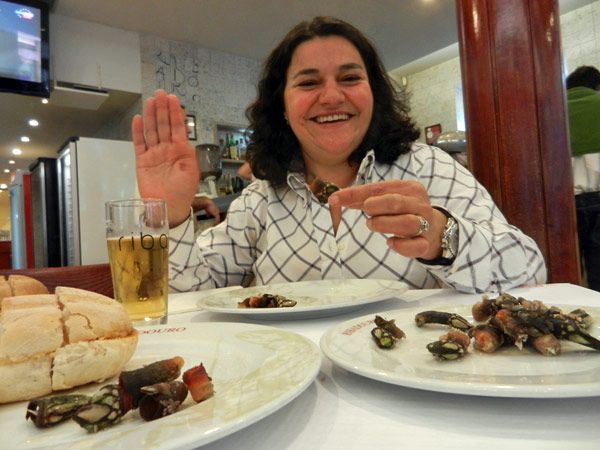On my last visit to Lisbon, people were scampering to finish projects funded by the European Union. There was scaffolding everywhere and the buzz was: "This is the end of the easy money. Use it or lose it!"
I should have known then, but there's no free lunch -- even in the European Union. Today, Portugal has come to its day of reckoning. The money has dried up, and the interest due on the debt is crushing the local workforce. Portugal's 11 million people produce about $240 billion annually -- nearly the same as Louisiana. But Portugal has about 14 percent unemployment. It once exported dried cod; now its top export is people.
Major projects in Portugal are not just stalled. They are stopped. The TGV-style bullet train from Madrid to Lisbon, the city's new airport and a planned freeway expansion have all been halted.
Last night, as we walked the newly pedestrianized streets of the Barrio Alto district, things were relatively quiet, even though 50,000 locals were packing the Lisbon stadium for the big, crosstown-rivals soccer match. During our stroll, my friend told me, "In pre-euro days, with the escudo as our currency rather than that deutsche mark in disguise, when there was no money for chocolate milk, we just made due with white milk. Until 1974, when we won our freedom from Salazar (Portugal's Fascist dictator was overthrown in the "Revolution of the Carnations"), we were on the donkey system. Then we got the fever. With the EU, dazzled by German standards, we were encouraged to have faith in debt. Portugal was made drunk economically by those cheap European loans."

Back in Lisbon, the first thing I eat (with my wonderful guide, Cristina Duarte): barnacles. I love barnacles.
Today Brussels sends the Portuguese not money but the "Troika," a trio of managers from the EU, IMF, and European Central Bank who enforce austerity measures to get things on a sustainable track. That means higher tolls on more highways, a new 23 percent tax put on all restaurants, higher deductibles for hospital visits, and cutbacks in health care. Utilities such as electricity are being privatized. Retirement was just raised from 65 to 67 years. And the Troika made the government rescind a worker-friendly scheme of the revolution which took a year's wages and broke it into 14 "months" rather than 12 to give workers a "bonus" each summer and Christmas. Now workers making over €650 (about $800 a month) get only 12 months' pay. As this was never really a bonus but just a forced savings account, this amounts to about an 18 percent cut in pay.
Local politicians are fighting despair. To the Troika, the Portuguese, compared to the Greeks, are considered very quiet workers with a nice reputation and good behavior: They're willing to take their medicine responsibly.
As for the traveler, despite the economic downturn, it's wonderful to be prowling the streets of Lisbon after dark. Trendy and stylish little bars and restaurants are working hard for their customers. On my first evening in Europe, I'm already back in my research groove.